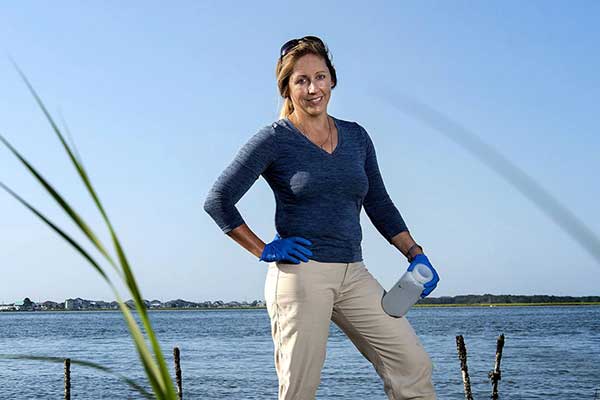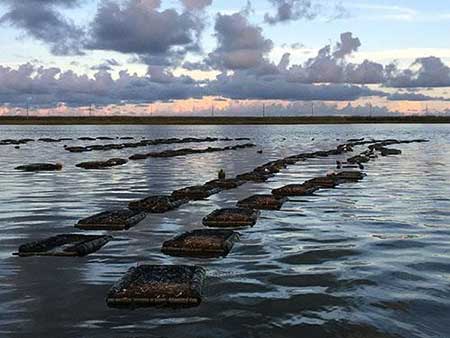By Sarah Padyk
Rachel Noble, a professor and researcher at the University of North Carolina at Chapel Hill, has engaged in cutting-edge research on North Carolina’s water and marine systems for 20 years. However, Noble’s career plans didn’t initially involve molecular biology research—she began her career in academia focused on aerospace engineering.
A Career Focused on Public Health: Both for People and Ecosystem Health
Noble began her undergraduate career at Carnegie Mellon University, where she eventually shifted away from engineering after discovering her passion for biological sciences. This change in her studies, paired with an opportunity to work in a laboratory with a faculty member studying metamorphosis in sea urchins, led Noble to attend the University of Southern California for graduate school. After earning a Ph.D., Noble accepted a position at UNC-Chapel Hill and never left.
With diverse expertise and interests, Noble researches topics that may appear unrelated at first glance.
“Instead of only working on a single basic science part of molecular biology, I’m studying molecular biology or microbes like pathogens, which is what I work on with viruses and bacteria in the context of the environment,” said Noble. “That almost automatically means that I am trying to answer questions about the viruses and the bacteria in the environment that relate back to public health, both for people and also ecosystem health.”
These remaining questions about North Carolina’s environment led Noble to her current relationship with the NC Collaboratory. Noble said that one of the main benefits of the Collaboratory is that novel ideas can quickly receive funding, while more traditional pathways to receive research funding can take at least six months. This open, communicative environment led her to her current research on oyster pathogens today.
“I’ll actually say that that’s one of the things the NC Collaboratory has really been famous for, is to try to bring the social science and the natural science and make it fit together. So, just the excitement of developing these new parts to maybe solve this problem is really neat.”
Rachel Noble

Connecting Wastewater Surveillance to Aquaculture
Noble’s recently funded oyster mortality project with the Collaboratory uniquely connects to a previous Collaboratory-funded project she developed to study COVID-19 throughout North Carolina’s wastewater systems. The original wastewater surveillance pilot project that the Collaboratory funded in 2020 permitted the creation of a statewide wastewater surveillance program for SARS CoV-2 that is part of a national program now run by the CDC.
“Another crisis unfolded while the rest of the world was shut down with COVID,” said Noble. “We had this phenomenon that was continuing to happen and get worse along the North Carolina coast with oysters grown along the coast by aquaculture. We started to witness oyster mortality that was far beyond what we had seen before.”

Noble and other researchers from universities across the state began collaborating to monitor and observe these events in the field. These researchers discovered that a parasitic pathogen was impacting the oysters, implementing a monitoring system similar to the COVID-19 wastewater project’s system. Noble reached out to the NC Collaboratory Executive Director, Dr. Jeff Warren, to request funding to study the phenomenon further.
“The question that we really posed that was different from our initial one was: Wouldn’t it be good if we could develop a red flag so that a farm actually knows that a mortality event is coming?” said Noble.
The project takes a collaborative and accessible approach to look at the issue from multiple angles and work with farmers on solutions. Noble said that for many of these farmers, there is the potential to lose millions of dollars of product if a mortality event takes place.
“This whole project is designed to actually interface directly with the oyster farms as part of the project and to understand what their concerns are about oyster mortality going forward,” Noble said. “We want to make sure whatever we do is accessible from the start to the growers themselves.”
Noble said she has several favorite parts of this project, including collaborating with colleagues from universities across the state and spending time in the field with farmers and her graduate students. She is excited about the potential impacts of this interdisciplinary work on North Carolina’s ecosystems and people.
“One of my top things about this project is that by better understanding how social scientists do their work, I have this constant thought about we could better integrate the social science side of this with the actual molecular biology,” Noble said.
Learn more about Dr. Noble’s work at the Noble Lab website.
Sarah Padyk is a graduate student at the UNC-Chapel Hill Hussman School of Journalism and Media and is an environment and science communication dual degree student. She graduated with a BS in environmental science from UNC-Chapel Hill in May and is currently working towards an MA in media and communication. She is a communications intern with the Collaboratory for the 2022 fall semester.
